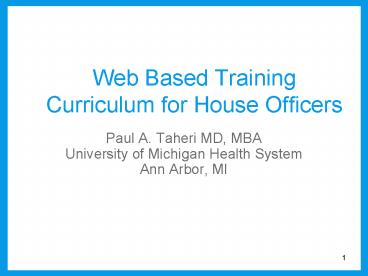Web Based Training Curriculum for House Officers - PowerPoint PPT Presentation
1 / 23
Title: Web Based Training Curriculum for House Officers
1
Web Based Training Curriculum for House Officers
- Paul A. Taheri MD, MBA
- University of Michigan Health System
- Ann Arbor, MI
2
Disclosure
- Paul A. Taheri MD, MBA is an Associate Professor
of Surgery and Associate Dean of Academic
Business Development at the University of
Michigan. - Dr. Taheri along with David Butz Ph.D. are
principals (with financial interest) in MDContent
(the web-based content provider referenced at the
close of this presentation).
3
Introduction
- Training programs are facing uncertain
educational objectives. - The precise definition of Systems Based
Practice is somewhat loose and not ill-defined. - If Programs are to deliver, assess, and assure
the attainment of this competency, a clear
definition and process for attaining this
competency should exist.
4
The definition of Systems Based Practice (SBP)
Competency 6
- SBP Is manifested by actions that demonstrate
awareness of and responsiveness to the larger
context and system of care as well as the ability
to effectively call on other resources within the
health system to provide optimal care.
5
Our activities
- Over the past 7 years we have developed a
comprehensive integrated business/health care
curriculum for physicians, house officers,
students (business and medical School), and
staff. - We have distilled the 2-year MBA into 50 hours
of training. - This has taken the form of multiple venues
including - Grand Rounds, multiple departmental
presentations, resident lecture series - 10-day course offerings
- 2 day course offerings
- Case studies
- We have also developed an implemented an
integrated 5-year MD/MBA program with over 24
graduates to date.
Executive Education model
6
Content development
- Business based curriculum which includes topics
such as - Economics, Operations Management, Finance,
Leadership theory, Physician Leadership,
Strategy, Marketing, and others - Developed in collaboration with the Ross School
of Business Faculty and the Center for Health
Care Economics.
7
Content development continued
- Center for Health Care Economics A joint
initiative between the Business and Medical
School. - Serves as a node for collaboration between
entities. - Leverages the B-school faculty, to address health
system problems with B-school students
functioning as the intermediary. - Generates case studies
8
UMHS Provides
RSB Provides
Center for Health Care Economics
CHCE
- Faculty Expertise
- Students (MBAs BBAs)
- Summer Interns
- Physical Space
- A community of scholars
- Data, Data, Data
- Students (MDs)
- Medical Expertise
- A live laboratory
- Modest financial support
Health System
Ross School of Business
- CHCE Activities
- Physician executive education
- Business strategic plan consulting
- Help in design of MD/MBA program
- MBA advising, including MAP teams, independent
studies, etc. - Data warehouse support Research support
services - Sponsoring guest speakers
9
Content delivery - Didactic
- Several Case Studies developed.
- Delivered to over 2000 participants.
- Has problems
- Expensive to deliver.
- Conflicting definition of content, therefore not
a cohesive curriculum. - Content delivered at single time. (i.e. schedule
lecture). - Faculty not willing to participate.
- Lack of time and expertise
- Difficult for H.O.s to attend.
- Associated with many interruptions (e.g. pager,
cell phones, consults).
10
Web based model vs. Traditional
- Issues
- Difficult to answer questions.
- More rigid presentation.
- Loss of direct interaction with professor.
- Benefits
- Scales across organization.
- Not time dependent.
- Tracking of participation.
- Ancillary content immediately available on site
(practice problems, case studies). - Test taking capabilities.
- Allows for report generation.
11
Curriculum design is modular
- Each module is designed to be completed in
approximately 45 minutes. - Focused on the basics of business applied to
health care. - Nothing fancy, just the relevant material.
- Residents can move at a pace of their choosing,
but we recommend about 10 modules/year 1/month. - Designed to provide graded responsibility in
learning. - Start with management principles then to
leadership. - Each module has a brief test and relevant
references.
12
Proposed Curriculum
13
Proposed Curriculum
14
Proposed Curriculum
15
Proposed Curriculum
16
What does this look like operationally?
Web based - course module (i.e. Operations
Management) (H.O. Login)
Exam
Report Generation
Once H.O. completes all 41 modules, then They
have completed the SBP curriculum.
Program Director
House Officer
17
How do we evaluate the resident competency on the
web?
- Document house officer participation can easily
be accomplished via web site. - Sign in/registration.
- Administer an on-line examination at the end of
each module. - Generate reports to program director and to
student. - Program director will receive annual tracking
status for each resident. - Once H.O. has completed the all modules a
completion report will be forwarded to both HO
and Program Director.
18
Reports
- Program Director reports can be generated to
deliver the following - Participants completion of curriculum.
- Individual test scores.
- Ranking relative to their peers (H.O. I vs. II
vs. III) or specialty. - Ranking within the entire HO pool.
- Ranking compared to other institutions (blinded).
19
How/when will this happen ?
- Status of our website.
- Currently site is functional but all
content/modules are loaded onto site. - www.mdcontent.com
- We will be fully functional by July 06, but site
is working today. - Other tools on the web may exist.
20
(No Transcript)
21
(No Transcript)
22
(No Transcript)
23
Summary - Our goal
- Deliver this content to every resident in USA.
- Share our collective education, business, and
health care experience. - Provide a template to demonstrate competence.
- Be the lowest cost provider in this space.































